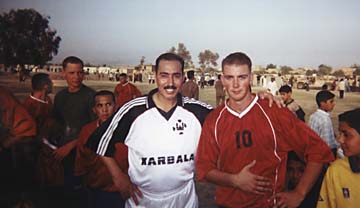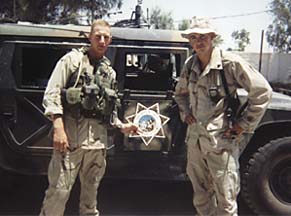|
THE QUESTIONS I GET FROM A LOT OF PEOPLE HERE ARE, "What's going on over there? Why is there so much fighting? Why do the Iraqi people hate us so much?" When I first heard that, that's when I realized that the news was not proportionate to what was going on in the country. I was in eight or nine cities in Iraq. Starting from Kuwait, we saw pretty much every city along the river on the way to Baghdad. People absolutely loved us everywhere we went. There were big parades. We'd just roll down the streets, or sometimes be on foot patrol, and kids would run out of their houses just to wave at us, just to get a wave back from us. People would give us flowers; they'd give us flowers and gifts and Pepsi -- all kinds of stuff. I'd have people come up to me and say, "What took you so long? You should have done this in '91!" Especially when we were in Baghdad. We were in this huge building, with a huge fence around it. I'd have a lot of people -- especially the elderly guys -- telling me, "I was tortured under this building for 12 or 14 years," or, "There's torture chambers under here." So we went down and checked it out, and sure enough, there were torture chambers under there -- basically an entire block, underground, with cells and everything else.
MISSION TO KARBALA Right after Baghdad fell, our mission was to go straight to Karbala and start setting up there, because that's where we needed to be [Karbala is located about halfway between Baghdad and the southern Iraqi city of Basra]. But we actually ended up just going out into the middle of the desert at first, because there were so many people moving through on their way to Karbala. They were having a parade and everything. We had our intelligence unit go talk to them, and we learned that they were having a big religious celebration -- they hadn't been able to do it in 35 years. [Being Shiites, they were repressed under the rule of Saddam Hussein, a Sunni Muslim]. We wanted them to be able to do that. We didn't want to get in the way of that, obviously. We stayed out in the middle of the desert for four days, letting them have their celebration. Our battalion was five companies. Each company was assigned to a different sector of the city. Karbala is very condensed. There are about 300,000 or 400,000 people, with a little city center with a bunch of shops. Our company found a school to stay in, but that school was opening the next week -- which was a good sign, because they were already starting to get things going again. [This was a few weeks after the main phase of the war, in late March and early April]. So then we moved into an abandoned military school. We set up security right away, then we started sending out patrols and talking to people. We scouted out the schools and hospitals. We painted the schools, we gave candy to the kids and we went to the schools and gave the kids a bunch of soccer balls. It was pretty rare for a kid to have his own soccer ball. [Photo below: Ingram in an Iraqi classroom]
CONFISCATING WEAPONS If there was shooting anywhere within a few blocks of our area, we'd send out a patrol. We'd try to get the weapons, as many of them as possible. We'd set up checkpoints -- guys on either side of the road in Humvees, waiting for someone to turn around and try to get out of there. That happened the first time I did a vehicle checkpoint. I was in charge of four guys in a Humvee. We saw this guy kind of turn off into a side alley, so we chased him down. After about three blocks we caught up to him. He had just stopped. We pulled him out of the car, and there was a loaded rifle on the front seat and a bag full of rounds. It was a long-range rifle with a round in the chamber, so we knew. He said, "I'm just a farmer. It's for my protection." It may have been for his protection -- we didn't know -- but he wasn't allowed to have that stuff. He definitely didn't have a U.S. military permit for it. So we arrested him and took him down to the police station. We flexi-cuffed him, put him in the back of the truck and took him down there. There were Army MP's and Iraqi police there, working together. We took him in to an Army MP, had him write down his name and what happened. I wrote a statement. They put him in a cell. I don't know what happened to the guy, honestly. He may have gotten a fine. I don't know how it works. The court system was pretty busy all the time, I know that. I heard a couple of days ago that we set up 600 courts in Iraq, just to keep the legal system going. My friend, who used to live in Iraq, said there was no real law. The government was the law. Here we have the law and we have the government -- there, it was just whatever the government said, went. Saddam's party was the law. We confiscated his weapon. We created an armory of a bunch of Iraqi weapons that we eventually turned over to the Iraqi police.
SECURING THE HOSPITAL We gave about 12 weapons to the hospital, so the security guards could have them. That was our biggest concern, that hospital. It was one of our main missions, and it was a huge success that we were able to turn it around. When we first got to the hospital, there was no security at all. The doctors would tell us about having to perform surgery at gunpoint or knifepoint. The gangsters would come in with their buddy, who was shot up or something -- they're not going to pay for it, obviously, particularly if they have a gun in the doctor's face. The doctors feared for their lives every day. There was so much revenge going around. If something happened, if someone died in the doctor's hands, they would blame the doctor. We were at the hospital for about two months. We'd do patrols, and we camped out in this hospital, the main hospital in Karbala. It was really a big hospital -- it had about 600 inpatients and about 400 outpatients. The emergency room was constantly flowing: gunshot wounds, explosions, all kinds of stuff. Just about all the doctors there spoke English. They would take us into their houses. They have living quarters right next to the hospital for just about 15 doctors. They'd talk about things that were going on and they'd cook meals for us. We just loved it, because we got a lot of their culture and they got a lot from us. It was really interesting to see how they thought. Every one of them was completely against Saddam. When we got there they were making $2 a month, which was less than the guy working in the cafeteria was making. That was their salary. The story they told me was that Saddam, when he was younger and kind of a thug, he got shot in the leg. He went to a surgeon and the surgeon wouldn't help him because he knew who Saddam was. So Saddam had a grudge against doctors ever since, and the money never came to the doctors or the hospital. The hospital was in just horrid shape. They had beds and emergency rooms, and that was basically all they had. They had some drugs, but they didn't have anything else to work with. It was pretty difficult. It was mostly smaller-unit leaders who made the decision to set up the hospital security. That's the good thing about the Marines -- we develop our small-unit leaders. You can give a guy the opportunity to make decisions. We were the biggest platoon, so they took our whole platoon and told us to set up the security. Me and a couple of other guys took charge of it. We made sure the shifts ran smoothly. TRAINING IRAQIS
So we had about 80 guys come into our compound. We started with the physical part of training. We ran them, we made them do push-ups and pull-ups. Each Marine took a group of them and ran them through a course. We taught them some martial arts training. We made them sweat, to test them. We told them, "If you can't do this, you're not going to pass." We had a little fun with it, too. We'd wrestle around with them, have fun with it. I had a joke with a lot of the guys. While they were doing push-ups, I told them to shout "Mustashfa!" -- the Arabic word for hospital. It kind of came back to get me, because after these guys were trained I'd walk around the hospital and hear "Mustashfa! Mustashfa!" everywhere I went. There were a lot of good guys there, funny guys. There were these three brothers, and they were all about 6-4, 6-5 -- really tall, really wiry. I met them at one of the doctor's house, eating lunch -- these guys came in, because they were the doctor's cousins or something. I was looking up at them, you know -- then they showed me their black belt cards. They were all black belts in karate. I was like, "Yeah, we need to hire these guys. Make sure they're there tomorrow for the training." They'd mess around all the time, put on a little show -- no one would mess with them. We did background checks on the recruits while we trained them. The first thing they'd do is sit them down with a translator and our platoon commander would talk with them, interview them. Then they'd kind of go through the town -- because pretty much everybody knew everybody -- and find out about people. It took a couple of weeks to get everyone trained, and by the end there were a few people who were dismissed because they had a bad past. People dropped out, because they didn't know what they were getting themselves into, but most guys made it through. We gave them uniforms -- blue shirts and dark slacks, with a stitching that said, "Al-Hussein Hospital, Trained by Marines" -- so that everyone knew who these guys were. Once they passed, we said, "All right, you're going to have a job. Come into work at this time." We had three or four Iraqi guys following a couple of our Marines at the front gates, a couple in the lobby, and we'd make them do the job. We'd make them open the gate, search people -- we'd just supervise.
A FLOOD OF PATIENTS So many people flooded into this place, every day. There were so many patients up there -- their families would bring them food and such. We just had to check them. During visiting hours we'd check them and let them through. The rest of the time we'd have to say, "No, you can't come in now." It was a big problem, because of the language barrier. The security guys just started growing balls, though, basically. They'd start dealing with these people, saying, "No, this is what's happening." It was a huge success when it came together. It really was. These two other guys and I ended up getting medals for it. It was such a big gold star for the battalion. They had asked the doctors there and the security to give them a couple of names. The doctors told them about me and these other guys because we were the higher-ranking people. We completely turned this hospital around. There were some doctors who were going to leave -- they completely did a 180 after this. Thinking on your feet -- that's what it is. That's why, when I come back here, everything seems easy to me. It honestly does. I can't wait to start going to college, because I know that I'm just going to fly through. I can't wait.
IN THE NEWS | GARDEN | PUBLISHER | GOOD NEWS | CALENDAR
Comments? © Copyright 2003, North Coast Journal, Inc. |

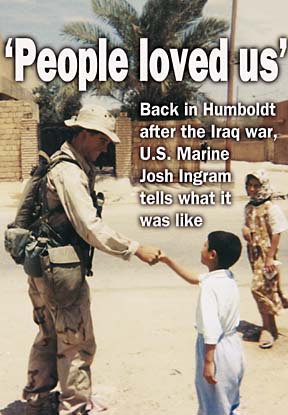
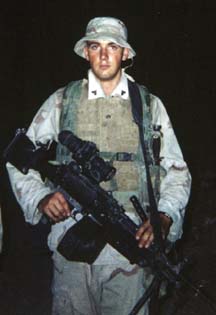 JOSH
INGRAM, 20, a graduate of Arcata High School, is a machine gun
squad leader in the 3rd Battalion of the United States Marines.
Like thousands of American soldiers, he's spent much of the year
in the Middle East, first in Kuwait -- the invasion point --
and then in Iraq, which fell in three weeks of fighting in late
March and early April.
JOSH
INGRAM, 20, a graduate of Arcata High School, is a machine gun
squad leader in the 3rd Battalion of the United States Marines.
Like thousands of American soldiers, he's spent much of the year
in the Middle East, first in Kuwait -- the invasion point --
and then in Iraq, which fell in three weeks of fighting in late
March and early April.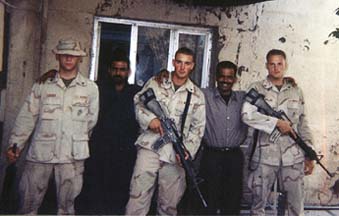
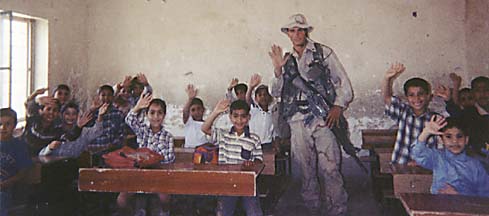
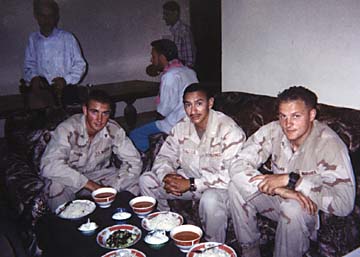
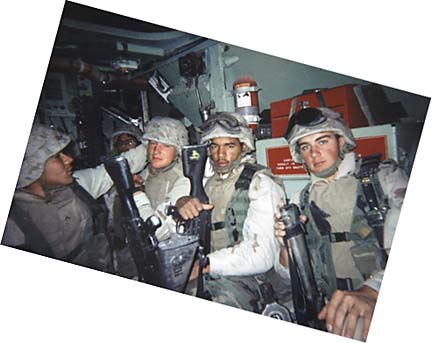 Our
translators and the administration at the hospital started putting
the word out, throughout the city: "We're hiring. We've
got 60-some positions for security we have to fill. Come to this
location at this time and we'll start training."
Our
translators and the administration at the hospital started putting
the word out, throughout the city: "We're hiring. We've
got 60-some positions for security we have to fill. Come to this
location at this time and we'll start training."